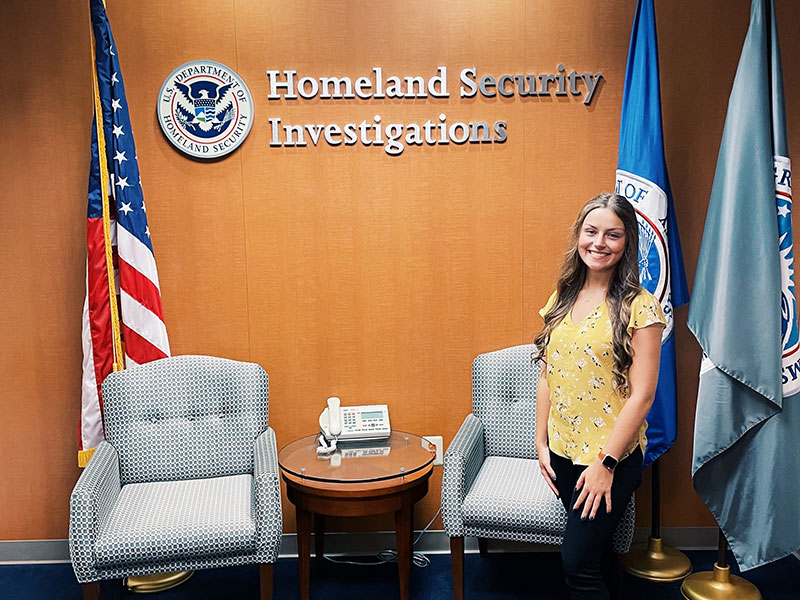Immaculata News
Cybersecurity Major Gets First-Hand Experience Interning with Homeland Security
Tags: criminology cybersecurity

Although Makenna Piaskowski ’24 is not sure what career path she wants to pursue, she has always been interested in computers. With this in mind, she decided to pursue a major in cybersecurity, a field that is projected to grow 35% through 2031 and has a median average salary of $102,600 according to the Bureau of Labor Statistics. Immaculata is one of the few smaller universities that offers a major in cybersecurity, which appealed to Piaskowski. Wanting to enroll in a university with smaller class sizes so she could interact more with her professors, she chose Immaculata.
In fact, her relationships with Immaculata professors helped Piaskowski get an internship with the cybercrime investigation taskforce of the Philadelphia office of Homeland Security Investigations (HSI). Lisa Brown, associate faculty in sociology and criminology, encouraged her to apply for the internship after Piaskowski attended a HSI career fair where she met two agents, one of whom later presented on career opportunities in Brown’s class. Piaskowski, who expanded her focus with a dual major in cybersecurity and information systems and a double minor in criminology and digital forensic, applied and was chosen for the internship for fall 2022.
While interning at the Department of Homeland Security Customs Enforcement Office in Center City Philadelphia, she accompanied the Customs border patrol agents on various operations, including identifying suspicious passengers at the airport to checking for illegal packages.
“A big part of it was just shadowing people,” she said. “I didn’t realize there were so many different jobs within the agency. So, I was able to see what each job entailed.”
This experience helped her decipher what she was interested in–and what she wasn’t. It didn’t take long for Piaskowski to discover that she was more interested in the analytical aspect of investigative work than being in a public-facing role, like the agents. She also noted that positions within analytics are usually available because there are more applicants seeking jobs as agents.
Analysts directly help the agents by doing some of the invaluable research. They have access to vast databases where, for example, they can check license plates that were spotted near crime scenes or identify persons of interest.
“They try to connect things to each other or see if one case is connected to another,” she explained. “They try to find any information that would help the agents move their cases along.”
The computer lab work that the digital forensic team conducted also piqued her interest. Extracting data from digital devices that are brought in as evidence is the type of cyber analysis work that she interested in pursuing. Equally interesting to her was crypto-tracing, a way to track crypto-currency that is typically used to purchase drugs on the dark web.
“It’s time-consuming and hard, but not impossible.” she said of tracing crypto currency.
Beyond working with the cybercrime investigations unit, Piaskowski also gained experience with other government agencies that dealt in human trafficking, child exploitation and white-collar crimes. The internship with HSI has given her an appreciation for the work that the agency does daily to keep citizens safe.
Next, she hopes to expand her professional exposure with a second internship at a private sector security company. In addition to her internships, she was chosen by her professors to attend the RSA Conference in San Francisco in April. The annual conference is dedicated to cybersecurity issues and Piaskowski is excited for the opportunity to learn more about the field and expand her professional network.
“I’m really close with some of my professors, and I feel like that has helped me get where I am, and has given me the opportunities that I’ve had,” she stated.